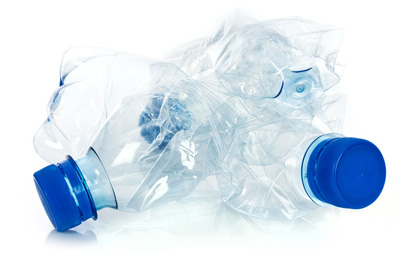
May 16, 2019 - SABIC introduced its LNP Elcrin iQ portfolio of polybutylene terephthalate (PBT) compounded resins derived from recycled polyethylene terephthalate (rPET). The company says that the new range of products supports the circular economy and help reduce plastic waste. By chemically upcycling consumer-discarded PET (primarily single-use water bottles) into higher-value PBT materials with enhanced properties and suitability for more-durable applications, the company is encouraging the use of recycled resins. These products also offer a smaller cradle-to-gate environmental footprint than virgin PBT resin, as measured by Cumulative Energy Demand (CED) and Global Warming Potential (GWP).
Longer Life than PET
SABIC’s LNP Elcrin iQ compounds and blends are based on upcycled iQ PBT resins, a proprietary SABIC technology. This technology overcomes some of the limitations of mechanical recycling by using chemical processes to depolymerize PET bottles and other PET waste into their precursor chemicals, purify them and then use them to create new PBT resin. SABIC says that the technology can deliver performance and processing benefits such as good chemical resistance, colorability, high flow for faster throughput and flame retardance (FR).
LNP Elcrin iQ resin is a drop-in solution for virgin PBT and other conventional PBT materials, making it easier for manufacturers to make their products more sustainable. By displacing virgin raw material used to manufacture PBT, LNP Elcrin iQ resin has been shown through peer-reviewed life cycle assessment[1] to reduce the energy and carbon footprint of the material by up to 61 percent and 49 percent, respectively. Further, each kilogram of LNP Elcrin iQ resin uses up to 67 post-consumer PET water bottles (0.5 liter).
The Elcrin iQ portfolio offers customers multiple options, including glass- and mineral-reinforced grades and non-halogenated FR and UV-resistant formulations. Some of the LNP Elcrin iQ grades even have the potential to achieve compliance with U.S. Food & Drug Association (FDA) food contact regulations.
Potential applications for these new polymers include durable internal and aesthetic components for consumer electronics, automotive connectors, and housings for medical devices. Such applications can extend the useful life of the original, single-use PET resin, which helps keep the material out of the waste stream for a longer period.
“Consumer-discarded PET bottles lose value and performance properties through conventional mechanical recycling,” said Joshua Chiaw, Global Business Director, LNP, SABIC. “This downcycling process limits the types of applications for which rPET can be used. In contrast, SABIC’s chemical upcycling process helps improve the performance and quality of the final resin product. As a result, these PBT materials are potentially more desirable for durable applications. Overall, LNP Elcrin iQ materials can help reduce reliance on virgin resin and address industry and consumer demand for greater use of more-sustainable materials.”
“The development of LNP Elcrin iQ materials is a major step forward for SABIC and illustrates our unyielding commitment to our customers, the global plastics industry, and the Alliance to End Plastic Waste, which we joined as a founding member,” said Frank Kuijpers, General Manager, Corporate Sustainability, SABIC. “Our innovative process for chemical upcycling of single-use PET directly supports the AEPW’s goal of developing new technologies that help minimize waste, make recovering and recycling plastics easier, and create value from all post-use plastics.”
Source: SABIC